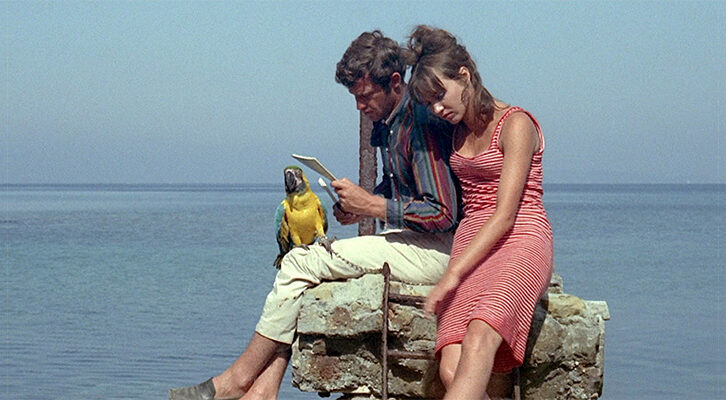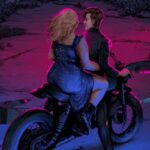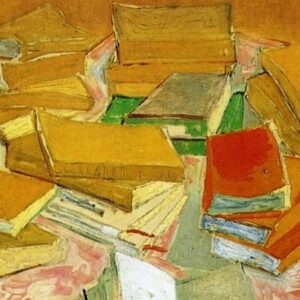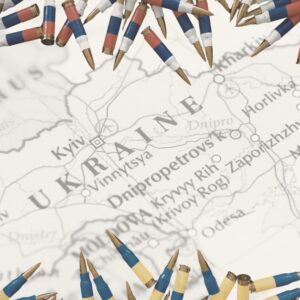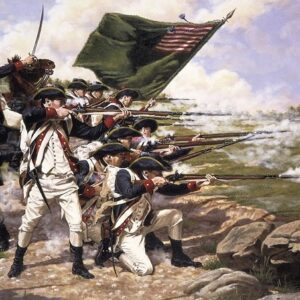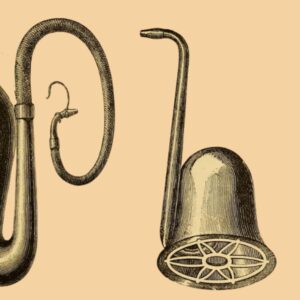
What If the Apocalypse Just Meant No More Social Media?
Laura Sims and Kenneth Calhoun in Conversation About the End of the World
Laura Sims’ Staying Alive is available now from Ugly Duckling Presse. Kenneth Calhoun’s Black Moon, is available from Hogarth.
Laura Sims: I was thinking today, while revisiting your harrowing and gorgeous Black Moon, and also stopping now and then to get a Facebook or a Twitter fix, how I long, sometimes, for the silence of apocalypse. I don’t mean actual physical silence, of course, but the noise of our particular space and time, the noise of social media and what it has wrought: the Age of Me (and My Ideas / Opinions / Feelings about Everything). I’m implicating myself in this, too, though I don’t navigate those social media spaces with the savvy and consistency that many do, but all the same… wouldn’t it be nice to have all of that swept away? Awful, too, because it would mean an end to global connectedness and a thriving virtual community, but nice. A blank slate. Some peace and quiet in the mind. And I was thinking too how ironic it is, in Black Moon, that sleeplessness becomes the tool that brings us to that quiet, ended place—especially when insomnia can be a byproduct of the endless media cycle. Were you thinking along these lines at all when writing Black Moon, or do you think along them now, looking back on the book?
Kenneth Calhoun: I love those haunting hushed earth moments of apocalypse that cinema captures particularly well. In terms of physical silence, I’m thinking specifically of the opening scenes of 28 Days Later—those empty London streets—or the vast empty landscapes of The Road. As you say, in my already-dog-eared and adored copy of Staying Alive:
At dawn. Every blasted city
Stilled—
Yes, the notion of cyber silence has always intrigued me. To me, all that online chatter is like the chaotic interior monologue of a species. The thought of it going quiet has irresistible appeal—a purging, a quieting of the hivemind, the planet finally able to hear itself breathe. All those profane comments sections erased forever. I tried to show some of that in Black Moon, like when Lila’s online friends slowly disappear and the social spaces she frequented go dark. There was more of that, but I cut it, because it seemed to tug at the wheel and take the narrative a bit off course. But it’s still there as one of the skins we shed when the world goes dark, leaving us increasingly naked and partially erased. On the topic of “blank slate” and silence, I am so compelled by the white space in your book. It conveys isolation more effectively than one can with a page packed with prose. How do you hope the white space functions in this piece, regarding the conveyance of desolation and doom? I suppose I’m asking as both a reader and a graphic designer.
LS: I’ve always been a big fan of white space on the page—whether I’m reading poetry or writing it. I depend on poetry as a space for going deep, silent and internal, and white space stands in, I think, for that inwardness. And possibly heightens it, helps “quiet the hivemind.” Setting these poems in the post-apocalypse world, and then filling the pages with white space between the lines does, I hope, convey some desolation, isolation and doom—the blanking out of what has been, and the blindness surrounding the future. But also, maybe, a little bit of light or possibility. I’m thinking of that Virginia Woolf quote, “The future is dark, which is the best thing the future can be, I think.” White space creates room for that suggestive darkness and unknowingness.
Getting back to those “haunting hushed earth moments” you mentioned: I’m a fan of on-screen post-apocalypse landscape, too… I think one of the first films that really struck me in that way was I Am Legend. The images of Manhattan grown dense and green and overrun by deer (and, well, zombie vampires…) were so moving. More heartbreaking, almost, than a city simply blown apart, charred and in ruins. That would be a definitive end, at least—the world that goes on in the wake of some cataclysm or other just reminds us (as viewers still living in the old world) of what we could lose, and of how indifferently the earth would move on afterward. I was struck in this same way by the landscape of Black Moon, which carries such emotional weight: the desert, the half-abandoned city, and most poignantly to me, the ruined suburb (situated in the middle of a desert). A suburb like this is so quintessentially American. Such a symbol of reckless expansion into territories where humans simply don’t belong. When Lila wanders into this particular suburb, she notes, “Under the chaotic clutter of junk on the lawns and driveways, and a heap of ashes in the middle of the street, it was all brand-new.” There’s an unforgettably grotesque parody of a neighborhood summer barbecue in this scene, and the whole suburb section comes across as both an indictment of and a requiem for the “American Dream.” I’m curious to know if your personal background colors this take on the suburbs.
KC: In the book, there is a simplistic, probably unfair, binary in which I characterize the suburbs as a place of sleep (“bedroom communities”) and cities as a place of wakefulness. This is a bit scornful and reductive on my part, but it’s really me just working out my rejection of and on-going obsession with the suburbs. I grew up in one of the most sprawling suburbs in the world (30 miles east of LA) and, as a teen, railed against its cultural somnolence. I wanted aliens to land, or bombs to drop, or something, anything, to happen. Its order and inherent conservatism (read Mike Davis’s City of Quartz) seems to beg disruption, chaos, and, in my biracial, punk-influenced mind, some kind of fantastic annihilation. So whether or not I intend to, I usually end up both skewering and celebrating the suburbs in my work. The truth is, I’m drawn to it and all those middle-class comforts. This pull was especially strong when my daughter was a small child, and you just want life to be safe and easy, ignoring the toll it takes on your soul and willfully staying oblivious to your own unearned privilege. The suburbs seem to enable a ruthless sense of self-preservation, especially on behalf of our kids. In the afterword of your book, you state that having a child changed the way you felt about The Road and other post-apocalyptic work. I think that’s speaking to the same feeling, where you want the fear to be compartmentalized and contained within the fictive realm of the book, just as I wanted my daughter’s earliest years to unfurl in the secure suburbs. When you have a child, and your worries extend far into the future, it completely changes your wiring. With that in mind, how do you think Staying Alive would be different if you had written it before your son was born?
LS: I did write a lot of it before he was born, actually, and I’d finished most of the reading that informed the poems beforehand, too. So by the time he was born, it was a matter of forming the lines in that floaty, poem-making headspace versus internalizing disturbing material. It’s true what you say about becoming a long-term worrier once you have a kid, and I think I may have channeled my anxiety about the future and all the looming, ever-present dangers and possible disasters into writing Staying Alive. It helped me “face” my fears, in a really safe, roundabout, imaginary kind of way. I also gravitated toward some lighter, more optimistic reading material after he was born—Rebecca Solnit’s A Paradise Built in Hell comes to mind, along with the classic survival guide, How to Stay Alive in the Woods—so I went in for books that offered practical solutions and/or positive spins on post-apocalypse scenarios, and they helped me deal with my newly heightened anxiety while continuing to write the book. There are many places in Black Moon where I read some form of parenting-related anxiety. Lila’s parents stand out, of course—the sleepless couple who can’t stop themselves from attacking their sleep-gifted daughter—as do the sleepless parents who lose (as in misplace) their newborn. That was absolutely terrifying to read. How do you think your identity as a parent influence the writing of Black Moon?
KC: Like you, I think it gave me a broader spectrum of anxieties, frankly, and a more direct line to pure desperation. And I drew from this for those sections you mentioned. I am, as I have said elsewhere, a great sleeper. Normally I have no trouble dropping off. But during that first year or two of parenthood, I remember being taxed to the point that I could see into a kind of annihilating exhaustion. I also recall a time, while driving on the freeway in California, when my toddler daughter started screaming inexplicably in her childseat. I had no idea what was going on (and never figured it out). She sounded so panicked and tormented that I recklessly pulled over onto the median and yanked her out of her seat, thinking she was maybe being bitten or jabbed by something. I remember holding her on the roadside while cars and trucks barreled past, blasting us with wind and sound, and I thought, even in that moment, that it was an apocalyptic predicament. I felt her total vulnerability in the face of certain, unstoppable doom, and how my own vulnerability provided such a thin membrane of protection. That insight certainly informs the chapter you mentioned about the missing baby. Of course, what I’m describing above is the opposite of those scenes we mentioned earlier, when the freeways would be clogged with abandoned cars and the roar of machines is silenced. We’ve talked about civilization shutting down, but let’s talk about what happens to a certain degree in both our books: nature, the wilderness, filling in the void left by human extinction. After all, our vulnerability in an unchecked wilderness would be just as anxiety-inducing as man-made environments, wouldn’t it? In my book, I have two characters—Chase and Jordan—who leave the suburbs of Southern California for the Beartooth Highway region of Montana. There they plan to wait out the insomnia epidemic away from civilization. But Chase is drawn to the nearby town, which leads to trouble, of course. In Staying Alive, there seems to be a stage of post-apocalypse that involves a return to Nature, or Nature’s return. There is a variety of perspectives, or vantage points, of “the city.” Some views from within, and others at a remove. In the third section, there’s a sense of pioneering, of moving into the wild spaces and resuming a foraging lifestyle. “Here grew the tall trees / here hung the large stars.” Is the prospect of returning to Nature a nightmare of yours, or a beautiful dream?
L: Both! It’s definitely a beautiful dream, or a fantasy of mine, but realistically? My family and I would probably be dead within a week, out in the wilderness. Or barely surviving, at least, in the most hardscrabble and pitiful way. Like many of us would be. I’ve been reading Little House in the Big Woods to my son lately, and it’s kind of stunning that people on this land, in this country, less than two hundred years ago, used to know how to make everything from scratch. Even bullets! The Native Americans, the pioneers…what has happened to that collective human knowledge? I suppose it’s preserved, in this country at least, primarily by fringe groups of survivalists, and by people living in or on the edge of poverty who have no choice but to make things to survive. So yeah, I think the dream would quickly become a nightmare if it were ever to come to pass, and in the poems I vacillate between an impersonal, accepting (even celebratory, at times) perspective that acknowledges Nature’s rightful dominion and a more frantic human perspective of the urban dweller caught in a terrifying new world where all rules, comforts, boundaries and even “necessities” have dropped away. Of course this paints Nature and humanity in dialectical opposition, which is too simplified—but it reflects how detached we’ve become from the natural world.
Chase is one of my favorite characters in Black Moon. He reminds me of Denis Johnson’s Fuckhead from the magnificent Jesus’ Son, though Chase is utterly unique in his own right, too. At first he is just this naive suburban American teen, but then the journey he and Jordan take sparks a transformation that begins with him taking Viagra (or something like it) for his inexplicable impotence and getting this eternal hard-on. Aside from it being hilarious and strange, Chase’s erection seemed to me like Nature rearing its head (ahem), awakening with a vengeance, as it does elsewhere in the book, too. When Chase acquires that herd of sheep, it only adds to the hilarity and absurdity—he’s this shepherd at the end of the world, as our agrarian-based culture lies sleeplessly dying, with real sheep and a “staff” or “rod” at hand. It’s too much—poignant and brilliantly absurd all at once. I wanted Chase to survive so badly but (spoiler alert!) felt his (probable) death was perfectly appropriate, too—the epidemic conquers him, as it conquers most of the characters. And even the “solution” to the crisis is a “workaround,” as some character describes it—it’s not a genuine cure, but more of a bandaid on a bullet wound. Is there part of you that felt a kind of triumph or satisfaction in writing those scenes where humankind gets trumped by Mother Nature? Obviously, we are part of Nature ourselves, but the tattered relationship between humanity and the rest of the natural world seems to come full circle in Black Moon.
K: I wanted to have two rising tides in the book: Nature, yes, but also the realm of dreams, a surfacing of the subconscious. Both require a ton of human resources and industry to hold at bay. The way the human colony is configured is built along battle lines with Nature and the truest version of so-called reality: the irrational and illogical forces of the dream world. One character in the book, I believe it’s Chase’s buddy, Jordan, states that dreams will happen whether or not we sleep, either as dreams or in the form of visions and hallucinations. That is, we access the dreamworld through both sleep and sleep deprivation. He concludes that this means the wilderness of the dreamworld is our true world; a state of order, reason and logic is only an illusion perpetuated by the waking mind. At the end of the book, I wanted the human project to be under siege by the forces of Nature and the dreamworld wilderness. Society is just a sand castle that these two forces are slowly dismantling and dissolving. The “workaround” you mention allows people to maintain the illusion of order, but at the cost of their dreams. Only a true sleeper, Biggs, can continue to dream and he is positioned as the bridge to the world of the subconscious. In reciting the dreams, he provides the surviving humans with some connection to the fullest human experience. The idea is that he will prevent them from succumbing to madness by providing small doses of dreams, like a vaccine. Of course, the problem is that he only dreams about his missing wife and the other survivors can’t connect with the very specific nature of his narratives. (This was also my attempt to talk in a sly way about writing and storytelling, but that’s another conversation.) The change he undergoes at the end is triggered by the acceptance that his wife is truly lost. This allows him to move on, to dream about other, more universal, subjects that will be truly beneficial to the survivors. This is, for me, the resolution of the book.
Staying Alive seems to have a similar reckoning. The journey it offers is fantastic. I’m astonished by the fullness of the experience it offers. The narrative, which brilliantly juxtaposes flashes of rich images with the colossal heft of negative space, sits in my mind like a life that I may have lived in some other dimension/time. I feel the memory of it, now absorbed in my own language of apocalypse, that viscerally. After a pursuit of a pair of wolves through the forest, the book ends with the lines:
We drew close to something then
We who don’t live
On this earth
The survivors are wanderers through wilderness and vast torchlit landscapes. There is a sense that what has been upset most is a sense of home and belonging–that the planet itself is now strange and foreign and people are not masters of Nature. Instead, they have become it. The question I think that we are both leaving our readers with is, What’s to become of us? Do you not partially suggest an answer with the epigraph for the section? It’s a quote from Rebecca Solnit: “He ceased to be lost not by returning, but by turning into something else.” What is it that you think we will turn into?
L: I like that idea of the survivors becoming Nature…I suppose I want to suggest that whatever happens, whatever becomes of those of us who survive, it will be all right—that we will cease to be lost by becoming whatever we need to become in order for life to continue—on Earth or elsewhere. That the “tragedy” of apocalypse can actually serve as conduit for transformation, and life, after all is, is in constant flux, whether there’s an apocalypse to reckon with or not. This idea is perfectly encapsulated in the last two lines of Black Moon, when Biggs recalls a game he and his wife used to play. She would sniff him in the pitch dark and he’d ask, “Is it me?” Then he’d wait for her confirmation—though we know that now his wife is gone, unable to confirm or deny his identity, so the question hangs there, unanswered, “Is it me?” Biggs then “[falls] asleep and dream[s] about something else entirely,” as you mention above. He has become, or is becoming, something other than what he was, and that is just as it should be.











